Refugee Children's Mental Health Challenges
VerifiedAdded on 2020/11/12
|11
|1843
|465
AI Summary
The provided document discusses the challenges in meeting the mental health and wellbeing needs of refugee children and young people in England. It highlights the importance of assessing actual health care needs, addressing adaptations created among refugee groups, and providing nursing interventions. The document references various studies and reviews to support its arguments.
Contribute Materials
Your contribution can guide someone’s learning journey. Share your
documents today.
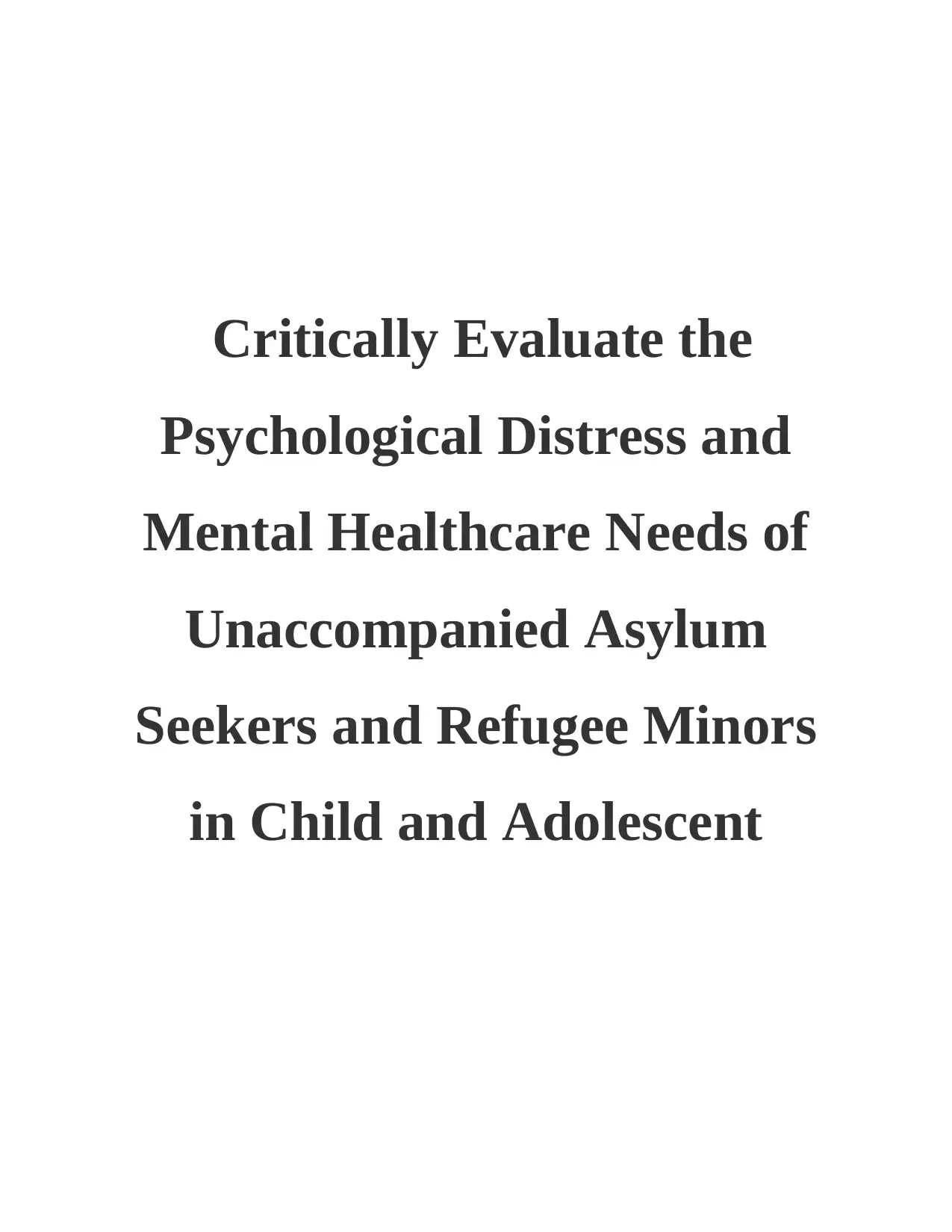
Critically Evaluate the
Psychological Distress and
Mental Healthcare Needs of
Unaccompanied Asylum
Seekers and Refugee Minors
in Child and Adolescent
Psychological Distress and
Mental Healthcare Needs of
Unaccompanied Asylum
Seekers and Refugee Minors
in Child and Adolescent
Secure Best Marks with AI Grader
Need help grading? Try our AI Grader for instant feedback on your assignments.
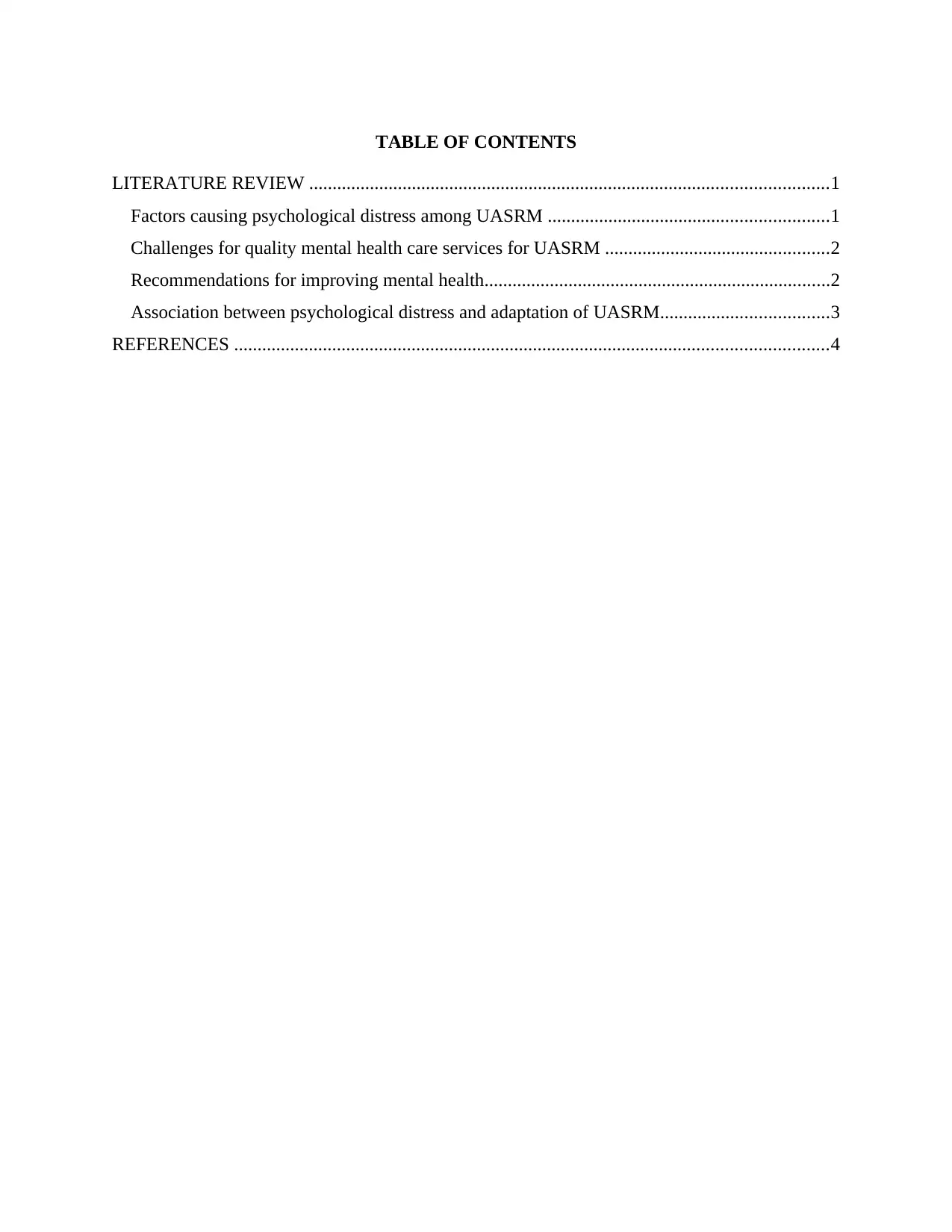
TABLE OF CONTENTS
LITERATURE REVIEW ...............................................................................................................1
Factors causing psychological distress among UASRM ............................................................1
Challenges for quality mental health care services for UASRM ................................................2
Recommendations for improving mental health..........................................................................2
Association between psychological distress and adaptation of UASRM....................................3
REFERENCES ...............................................................................................................................4
LITERATURE REVIEW ...............................................................................................................1
Factors causing psychological distress among UASRM ............................................................1
Challenges for quality mental health care services for UASRM ................................................2
Recommendations for improving mental health..........................................................................2
Association between psychological distress and adaptation of UASRM....................................3
REFERENCES ...............................................................................................................................4
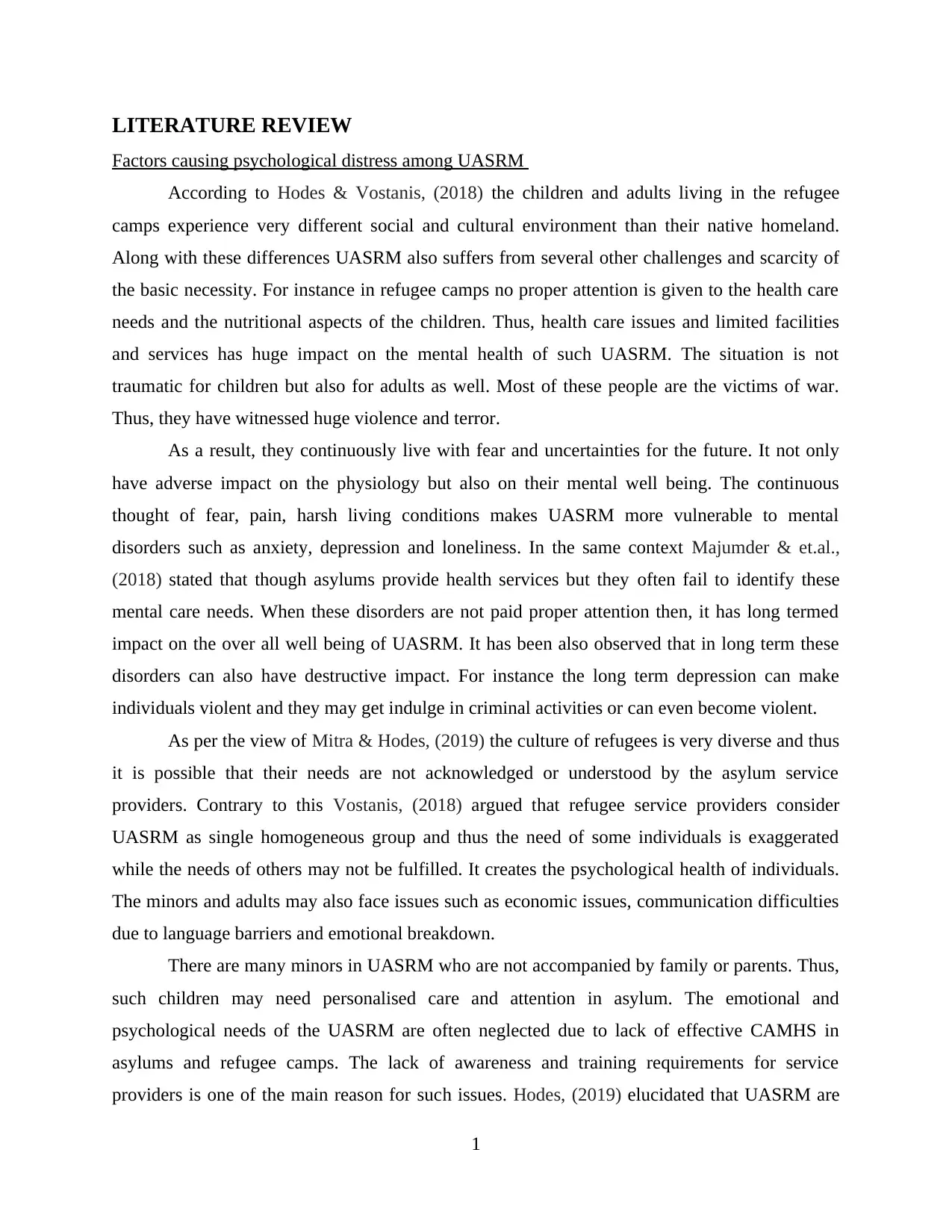
LITERATURE REVIEW
Factors causing psychological distress among UASRM
According to Hodes & Vostanis, (2018) the children and adults living in the refugee
camps experience very different social and cultural environment than their native homeland.
Along with these differences UASRM also suffers from several other challenges and scarcity of
the basic necessity. For instance in refugee camps no proper attention is given to the health care
needs and the nutritional aspects of the children. Thus, health care issues and limited facilities
and services has huge impact on the mental health of such UASRM. The situation is not
traumatic for children but also for adults as well. Most of these people are the victims of war.
Thus, they have witnessed huge violence and terror.
As a result, they continuously live with fear and uncertainties for the future. It not only
have adverse impact on the physiology but also on their mental well being. The continuous
thought of fear, pain, harsh living conditions makes UASRM more vulnerable to mental
disorders such as anxiety, depression and loneliness. In the same context Majumder & et.al.,
(2018) stated that though asylums provide health services but they often fail to identify these
mental care needs. When these disorders are not paid proper attention then, it has long termed
impact on the over all well being of UASRM. It has been also observed that in long term these
disorders can also have destructive impact. For instance the long term depression can make
individuals violent and they may get indulge in criminal activities or can even become violent.
As per the view of Mitra & Hodes, (2019) the culture of refugees is very diverse and thus
it is possible that their needs are not acknowledged or understood by the asylum service
providers. Contrary to this Vostanis, (2018) argued that refugee service providers consider
UASRM as single homogeneous group and thus the need of some individuals is exaggerated
while the needs of others may not be fulfilled. It creates the psychological health of individuals.
The minors and adults may also face issues such as economic issues, communication difficulties
due to language barriers and emotional breakdown.
There are many minors in UASRM who are not accompanied by family or parents. Thus,
such children may need personalised care and attention in asylum. The emotional and
psychological needs of the UASRM are often neglected due to lack of effective CAMHS in
asylums and refugee camps. The lack of awareness and training requirements for service
providers is one of the main reason for such issues. Hodes, (2019) elucidated that UASRM are
1
Factors causing psychological distress among UASRM
According to Hodes & Vostanis, (2018) the children and adults living in the refugee
camps experience very different social and cultural environment than their native homeland.
Along with these differences UASRM also suffers from several other challenges and scarcity of
the basic necessity. For instance in refugee camps no proper attention is given to the health care
needs and the nutritional aspects of the children. Thus, health care issues and limited facilities
and services has huge impact on the mental health of such UASRM. The situation is not
traumatic for children but also for adults as well. Most of these people are the victims of war.
Thus, they have witnessed huge violence and terror.
As a result, they continuously live with fear and uncertainties for the future. It not only
have adverse impact on the physiology but also on their mental well being. The continuous
thought of fear, pain, harsh living conditions makes UASRM more vulnerable to mental
disorders such as anxiety, depression and loneliness. In the same context Majumder & et.al.,
(2018) stated that though asylums provide health services but they often fail to identify these
mental care needs. When these disorders are not paid proper attention then, it has long termed
impact on the over all well being of UASRM. It has been also observed that in long term these
disorders can also have destructive impact. For instance the long term depression can make
individuals violent and they may get indulge in criminal activities or can even become violent.
As per the view of Mitra & Hodes, (2019) the culture of refugees is very diverse and thus
it is possible that their needs are not acknowledged or understood by the asylum service
providers. Contrary to this Vostanis, (2018) argued that refugee service providers consider
UASRM as single homogeneous group and thus the need of some individuals is exaggerated
while the needs of others may not be fulfilled. It creates the psychological health of individuals.
The minors and adults may also face issues such as economic issues, communication difficulties
due to language barriers and emotional breakdown.
There are many minors in UASRM who are not accompanied by family or parents. Thus,
such children may need personalised care and attention in asylum. The emotional and
psychological needs of the UASRM are often neglected due to lack of effective CAMHS in
asylums and refugee camps. The lack of awareness and training requirements for service
providers is one of the main reason for such issues. Hodes, (2019) elucidated that UASRM are
1
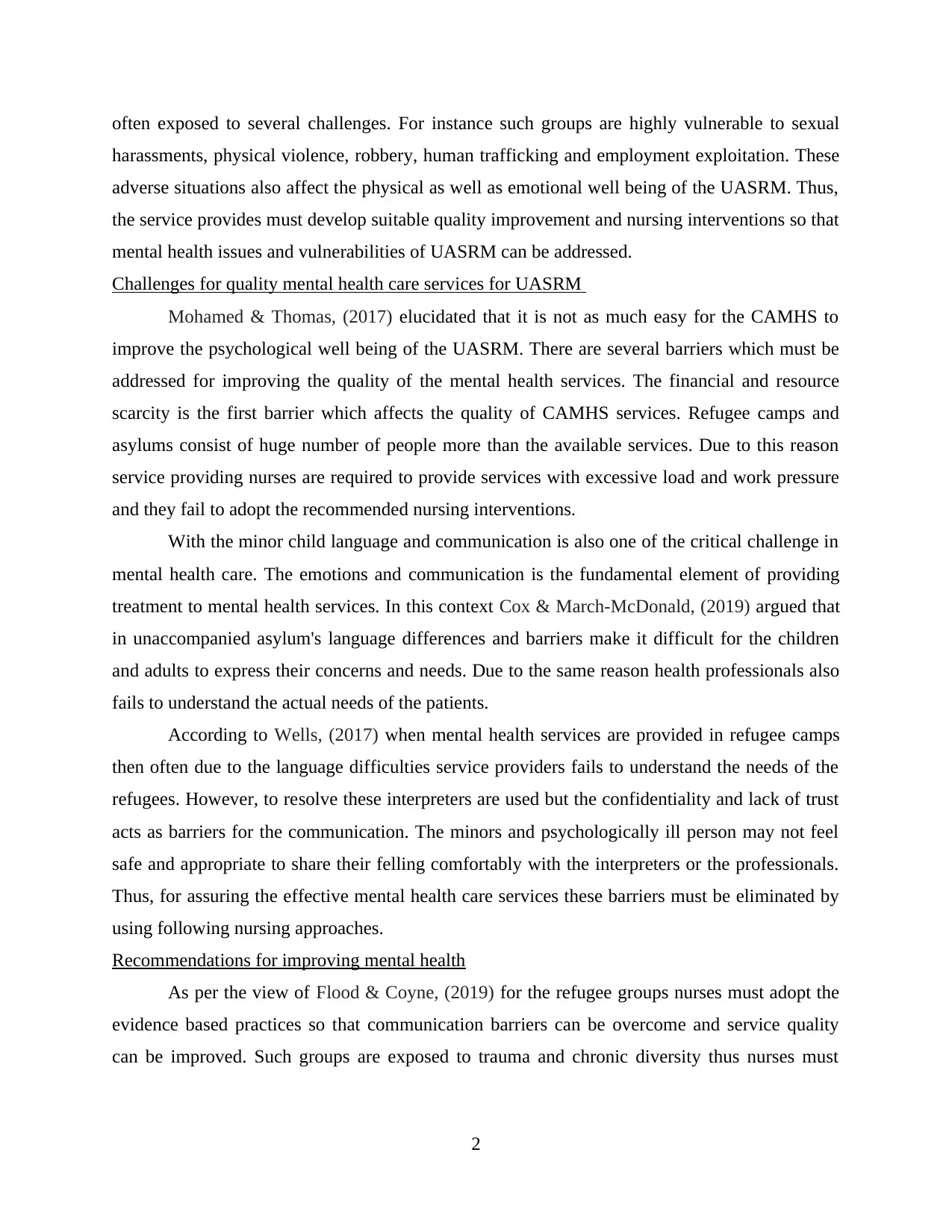
often exposed to several challenges. For instance such groups are highly vulnerable to sexual
harassments, physical violence, robbery, human trafficking and employment exploitation. These
adverse situations also affect the physical as well as emotional well being of the UASRM. Thus,
the service provides must develop suitable quality improvement and nursing interventions so that
mental health issues and vulnerabilities of UASRM can be addressed.
Challenges for quality mental health care services for UASRM
Mohamed & Thomas, (2017) elucidated that it is not as much easy for the CAMHS to
improve the psychological well being of the UASRM. There are several barriers which must be
addressed for improving the quality of the mental health services. The financial and resource
scarcity is the first barrier which affects the quality of CAMHS services. Refugee camps and
asylums consist of huge number of people more than the available services. Due to this reason
service providing nurses are required to provide services with excessive load and work pressure
and they fail to adopt the recommended nursing interventions.
With the minor child language and communication is also one of the critical challenge in
mental health care. The emotions and communication is the fundamental element of providing
treatment to mental health services. In this context Cox & March-McDonald, (2019) argued that
in unaccompanied asylum's language differences and barriers make it difficult for the children
and adults to express their concerns and needs. Due to the same reason health professionals also
fails to understand the actual needs of the patients.
According to Wells, (2017) when mental health services are provided in refugee camps
then often due to the language difficulties service providers fails to understand the needs of the
refugees. However, to resolve these interpreters are used but the confidentiality and lack of trust
acts as barriers for the communication. The minors and psychologically ill person may not feel
safe and appropriate to share their felling comfortably with the interpreters or the professionals.
Thus, for assuring the effective mental health care services these barriers must be eliminated by
using following nursing approaches.
Recommendations for improving mental health
As per the view of Flood & Coyne, (2019) for the refugee groups nurses must adopt the
evidence based practices so that communication barriers can be overcome and service quality
can be improved. Such groups are exposed to trauma and chronic diversity thus nurses must
2
harassments, physical violence, robbery, human trafficking and employment exploitation. These
adverse situations also affect the physical as well as emotional well being of the UASRM. Thus,
the service provides must develop suitable quality improvement and nursing interventions so that
mental health issues and vulnerabilities of UASRM can be addressed.
Challenges for quality mental health care services for UASRM
Mohamed & Thomas, (2017) elucidated that it is not as much easy for the CAMHS to
improve the psychological well being of the UASRM. There are several barriers which must be
addressed for improving the quality of the mental health services. The financial and resource
scarcity is the first barrier which affects the quality of CAMHS services. Refugee camps and
asylums consist of huge number of people more than the available services. Due to this reason
service providing nurses are required to provide services with excessive load and work pressure
and they fail to adopt the recommended nursing interventions.
With the minor child language and communication is also one of the critical challenge in
mental health care. The emotions and communication is the fundamental element of providing
treatment to mental health services. In this context Cox & March-McDonald, (2019) argued that
in unaccompanied asylum's language differences and barriers make it difficult for the children
and adults to express their concerns and needs. Due to the same reason health professionals also
fails to understand the actual needs of the patients.
According to Wells, (2017) when mental health services are provided in refugee camps
then often due to the language difficulties service providers fails to understand the needs of the
refugees. However, to resolve these interpreters are used but the confidentiality and lack of trust
acts as barriers for the communication. The minors and psychologically ill person may not feel
safe and appropriate to share their felling comfortably with the interpreters or the professionals.
Thus, for assuring the effective mental health care services these barriers must be eliminated by
using following nursing approaches.
Recommendations for improving mental health
As per the view of Flood & Coyne, (2019) for the refugee groups nurses must adopt the
evidence based practices so that communication barriers can be overcome and service quality
can be improved. Such groups are exposed to trauma and chronic diversity thus nurses must
2
Secure Best Marks with AI Grader
Need help grading? Try our AI Grader for instant feedback on your assignments.
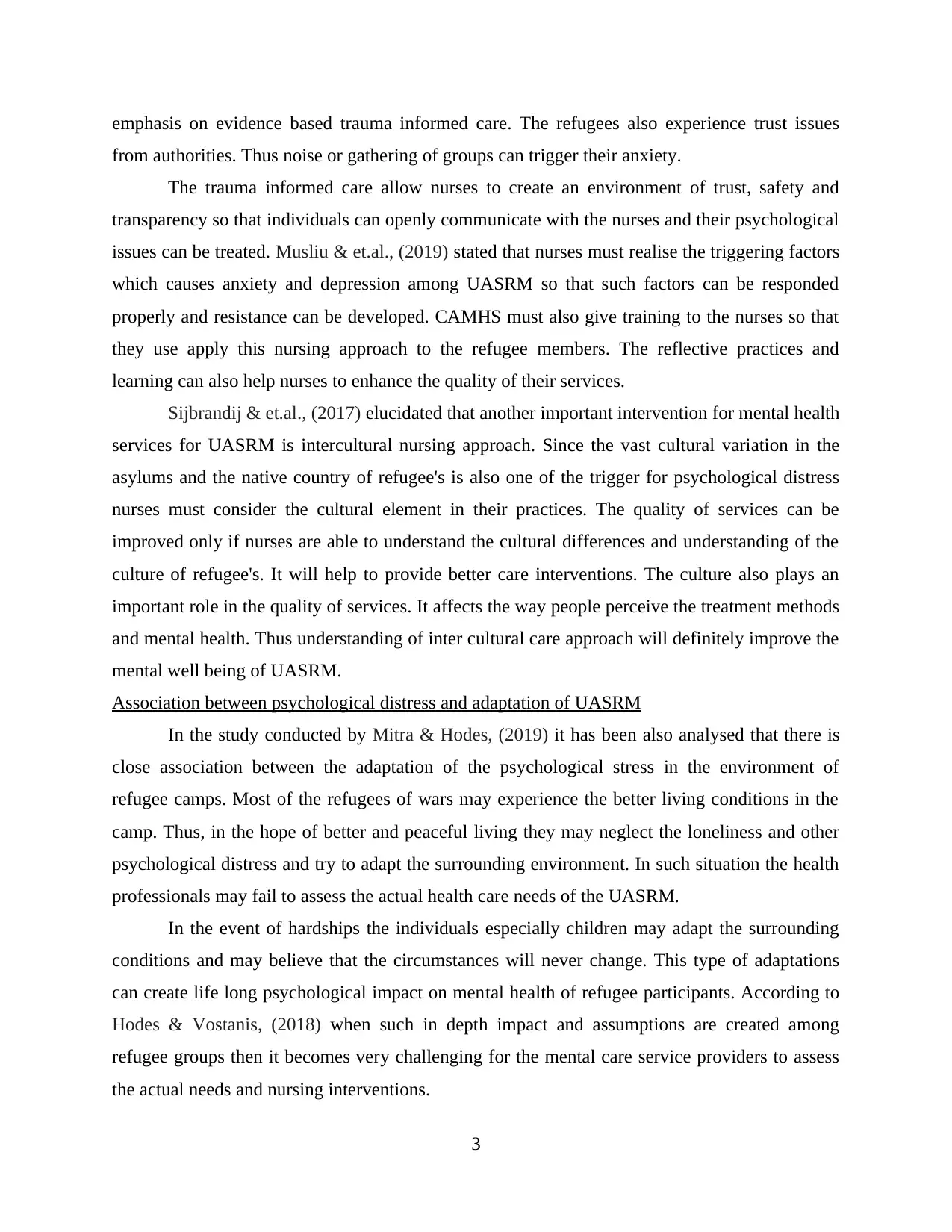
emphasis on evidence based trauma informed care. The refugees also experience trust issues
from authorities. Thus noise or gathering of groups can trigger their anxiety.
The trauma informed care allow nurses to create an environment of trust, safety and
transparency so that individuals can openly communicate with the nurses and their psychological
issues can be treated. Musliu & et.al., (2019) stated that nurses must realise the triggering factors
which causes anxiety and depression among UASRM so that such factors can be responded
properly and resistance can be developed. CAMHS must also give training to the nurses so that
they use apply this nursing approach to the refugee members. The reflective practices and
learning can also help nurses to enhance the quality of their services.
Sijbrandij & et.al., (2017) elucidated that another important intervention for mental health
services for UASRM is intercultural nursing approach. Since the vast cultural variation in the
asylums and the native country of refugee's is also one of the trigger for psychological distress
nurses must consider the cultural element in their practices. The quality of services can be
improved only if nurses are able to understand the cultural differences and understanding of the
culture of refugee's. It will help to provide better care interventions. The culture also plays an
important role in the quality of services. It affects the way people perceive the treatment methods
and mental health. Thus understanding of inter cultural care approach will definitely improve the
mental well being of UASRM.
Association between psychological distress and adaptation of UASRM
In the study conducted by Mitra & Hodes, (2019) it has been also analysed that there is
close association between the adaptation of the psychological stress in the environment of
refugee camps. Most of the refugees of wars may experience the better living conditions in the
camp. Thus, in the hope of better and peaceful living they may neglect the loneliness and other
psychological distress and try to adapt the surrounding environment. In such situation the health
professionals may fail to assess the actual health care needs of the UASRM.
In the event of hardships the individuals especially children may adapt the surrounding
conditions and may believe that the circumstances will never change. This type of adaptations
can create life long psychological impact on mental health of refugee participants. According to
Hodes & Vostanis, (2018) when such in depth impact and assumptions are created among
refugee groups then it becomes very challenging for the mental care service providers to assess
the actual needs and nursing interventions.
3
from authorities. Thus noise or gathering of groups can trigger their anxiety.
The trauma informed care allow nurses to create an environment of trust, safety and
transparency so that individuals can openly communicate with the nurses and their psychological
issues can be treated. Musliu & et.al., (2019) stated that nurses must realise the triggering factors
which causes anxiety and depression among UASRM so that such factors can be responded
properly and resistance can be developed. CAMHS must also give training to the nurses so that
they use apply this nursing approach to the refugee members. The reflective practices and
learning can also help nurses to enhance the quality of their services.
Sijbrandij & et.al., (2017) elucidated that another important intervention for mental health
services for UASRM is intercultural nursing approach. Since the vast cultural variation in the
asylums and the native country of refugee's is also one of the trigger for psychological distress
nurses must consider the cultural element in their practices. The quality of services can be
improved only if nurses are able to understand the cultural differences and understanding of the
culture of refugee's. It will help to provide better care interventions. The culture also plays an
important role in the quality of services. It affects the way people perceive the treatment methods
and mental health. Thus understanding of inter cultural care approach will definitely improve the
mental well being of UASRM.
Association between psychological distress and adaptation of UASRM
In the study conducted by Mitra & Hodes, (2019) it has been also analysed that there is
close association between the adaptation of the psychological stress in the environment of
refugee camps. Most of the refugees of wars may experience the better living conditions in the
camp. Thus, in the hope of better and peaceful living they may neglect the loneliness and other
psychological distress and try to adapt the surrounding environment. In such situation the health
professionals may fail to assess the actual health care needs of the UASRM.
In the event of hardships the individuals especially children may adapt the surrounding
conditions and may believe that the circumstances will never change. This type of adaptations
can create life long psychological impact on mental health of refugee participants. According to
Hodes & Vostanis, (2018) when such in depth impact and assumptions are created among
refugee groups then it becomes very challenging for the mental care service providers to assess
the actual needs and nursing interventions.
3
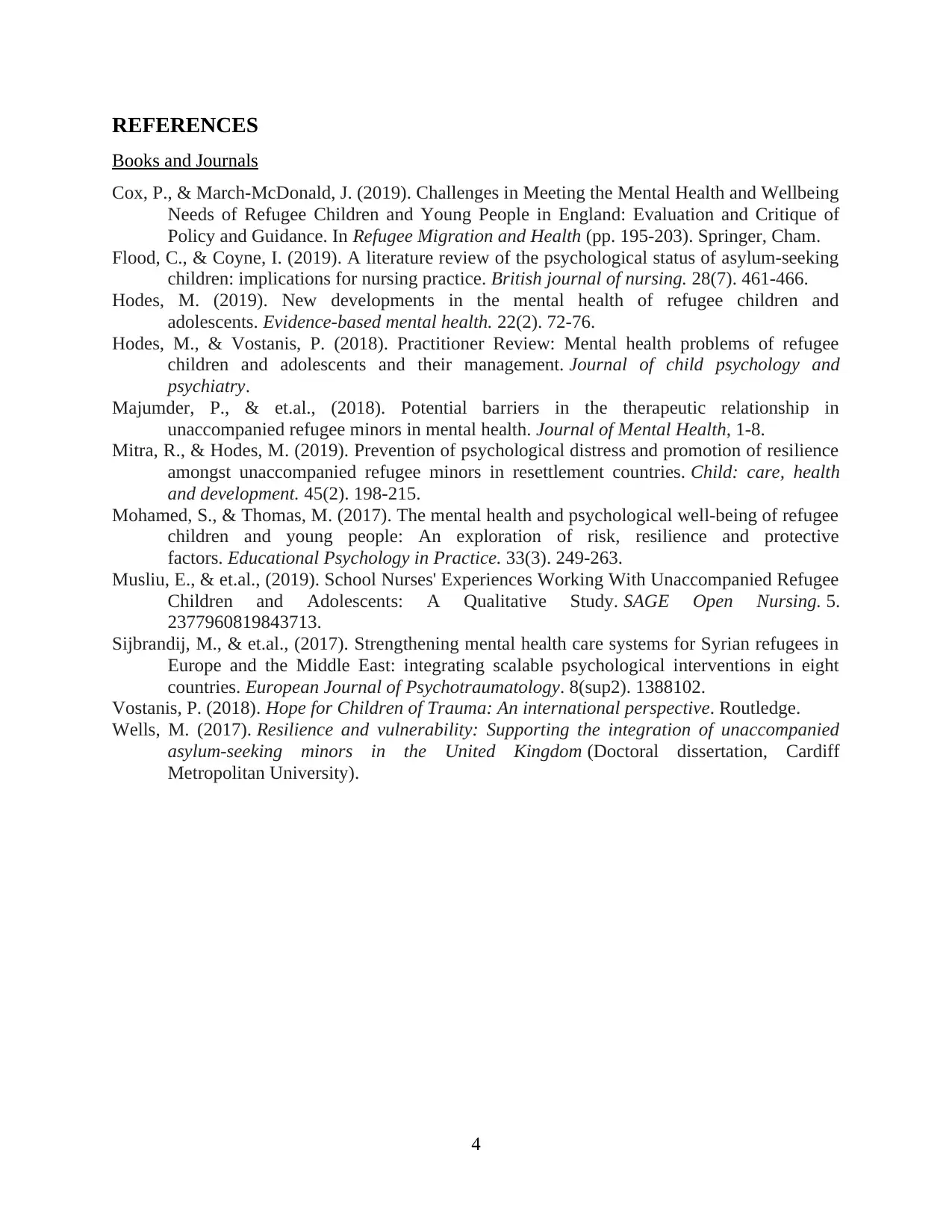
REFERENCES
Books and Journals
Cox, P., & March-McDonald, J. (2019). Challenges in Meeting the Mental Health and Wellbeing
Needs of Refugee Children and Young People in England: Evaluation and Critique of
Policy and Guidance. In Refugee Migration and Health (pp. 195-203). Springer, Cham.
Flood, C., & Coyne, I. (2019). A literature review of the psychological status of asylum-seeking
children: implications for nursing practice. British journal of nursing. 28(7). 461-466.
Hodes, M. (2019). New developments in the mental health of refugee children and
adolescents. Evidence-based mental health. 22(2). 72-76.
Hodes, M., & Vostanis, P. (2018). Practitioner Review: Mental health problems of refugee
children and adolescents and their management. Journal of child psychology and
psychiatry.
Majumder, P., & et.al., (2018). Potential barriers in the therapeutic relationship in
unaccompanied refugee minors in mental health. Journal of Mental Health, 1-8.
Mitra, R., & Hodes, M. (2019). Prevention of psychological distress and promotion of resilience
amongst unaccompanied refugee minors in resettlement countries. Child: care, health
and development. 45(2). 198-215.
Mohamed, S., & Thomas, M. (2017). The mental health and psychological well-being of refugee
children and young people: An exploration of risk, resilience and protective
factors. Educational Psychology in Practice. 33(3). 249-263.
Musliu, E., & et.al., (2019). School Nurses' Experiences Working With Unaccompanied Refugee
Children and Adolescents: A Qualitative Study. SAGE Open Nursing. 5.
2377960819843713.
Sijbrandij, M., & et.al., (2017). Strengthening mental health care systems for Syrian refugees in
Europe and the Middle East: integrating scalable psychological interventions in eight
countries. European Journal of Psychotraumatology. 8(sup2). 1388102.
Vostanis, P. (2018). Hope for Children of Trauma: An international perspective. Routledge.
Wells, M. (2017). Resilience and vulnerability: Supporting the integration of unaccompanied
asylum-seeking minors in the United Kingdom (Doctoral dissertation, Cardiff
Metropolitan University).
4
Books and Journals
Cox, P., & March-McDonald, J. (2019). Challenges in Meeting the Mental Health and Wellbeing
Needs of Refugee Children and Young People in England: Evaluation and Critique of
Policy and Guidance. In Refugee Migration and Health (pp. 195-203). Springer, Cham.
Flood, C., & Coyne, I. (2019). A literature review of the psychological status of asylum-seeking
children: implications for nursing practice. British journal of nursing. 28(7). 461-466.
Hodes, M. (2019). New developments in the mental health of refugee children and
adolescents. Evidence-based mental health. 22(2). 72-76.
Hodes, M., & Vostanis, P. (2018). Practitioner Review: Mental health problems of refugee
children and adolescents and their management. Journal of child psychology and
psychiatry.
Majumder, P., & et.al., (2018). Potential barriers in the therapeutic relationship in
unaccompanied refugee minors in mental health. Journal of Mental Health, 1-8.
Mitra, R., & Hodes, M. (2019). Prevention of psychological distress and promotion of resilience
amongst unaccompanied refugee minors in resettlement countries. Child: care, health
and development. 45(2). 198-215.
Mohamed, S., & Thomas, M. (2017). The mental health and psychological well-being of refugee
children and young people: An exploration of risk, resilience and protective
factors. Educational Psychology in Practice. 33(3). 249-263.
Musliu, E., & et.al., (2019). School Nurses' Experiences Working With Unaccompanied Refugee
Children and Adolescents: A Qualitative Study. SAGE Open Nursing. 5.
2377960819843713.
Sijbrandij, M., & et.al., (2017). Strengthening mental health care systems for Syrian refugees in
Europe and the Middle East: integrating scalable psychological interventions in eight
countries. European Journal of Psychotraumatology. 8(sup2). 1388102.
Vostanis, P. (2018). Hope for Children of Trauma: An international perspective. Routledge.
Wells, M. (2017). Resilience and vulnerability: Supporting the integration of unaccompanied
asylum-seeking minors in the United Kingdom (Doctoral dissertation, Cardiff
Metropolitan University).
4

5
Paraphrase This Document
Need a fresh take? Get an instant paraphrase of this document with our AI Paraphraser

6

7

8
Secure Best Marks with AI Grader
Need help grading? Try our AI Grader for instant feedback on your assignments.

9
1 out of 11
Related Documents
Your All-in-One AI-Powered Toolkit for Academic Success.
+13062052269
info@desklib.com
Available 24*7 on WhatsApp / Email
![[object Object]](/_next/static/media/star-bottom.7253800d.svg)
Unlock your academic potential
© 2024 | Zucol Services PVT LTD | All rights reserved.





